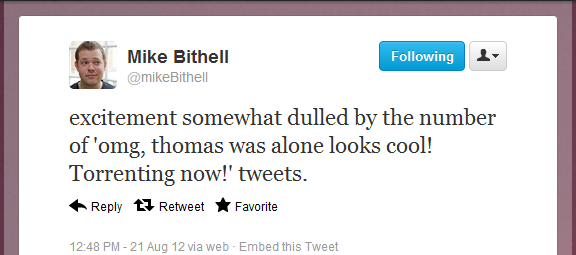Today, I spotted this tweet from Thomas Was Alone developer Mike Bithell which caused some thoughts to flicker across my brain:
I was very excited about the release of Thomas Was Alone – the game looked clever and fun and right up my street, and the soundtrack by David Housden, judging by the trailer (voiced by Danny Wallace, no less), was going to be awesome. However, when it came to the release date, it turned out that due to a temporary cash flow failure, I had no spare money.
I did not purchase the game, because I couldn’t.
However, the interesting part is that I also didn’t pirate it. Why not? I don’t know. For some reason (or intersection of reasons) it didn’t cross my mind to pirate it. Perhaps because I KNEW I would love it, perhaps because I KNEW I would buy it eventually, and perhaps because I also knew that Mike is the kind of guy I’d like to support (aka the kind of guy I don’t want to rip off). Maybe none of these reasons. Maybe because the ease of purchasing games via Steam and their frequent super cheap sales (and the lovely Savy Gamer run by the equally lovely Lewie Procter) mean that game piracy rarely crosses my mind these days.
I’m quite intrigued as to why I didn’t think to pirate it, what it means for me, and what it means for Mike and other game developers.
I have pirated games before. Nine times out of ten, after pirating a game, I then made a purchase of said game. There are a couple of examples that spring to mind that can illustrate this.
1. Pirates vs. Zombies – released 2009
Reason for pirating game:
As it was by the same people who did Bejewelled, I presumed it would be a half-arsed casual affair, not worth more to me than 99p if even that. However I wanted to give it a try at least.
Reason for subsequently purchasing game:
It was awesome! I got hours of fun out of it! My preconceptions were wrong and I felt like a tool because of them.
2. Quake 4 – released 2005
Reason for pirating game:
I wanted to play it RIGHT NOW and it was not available to purchase RIGHT NOW however it was available for illegal downloading RIGHT NOW so that’s what I did RIGHT NOW.
Reason for subsequently purchasing game:
Even if it was actually a bit crap, I had always loved the franchise with all my heart. I had played it and finished it and wanted to acknowledge that with a purchase. I never even took the physical disk out of the box.
Back to Thomas Was Alone. It was released earlier this year (2012) and there were no silly regional restrictions to prevent a purchase, and no silly DRM restrictions to suggest that piracy would be a better option.
Having not pirated the game, I then did not subsequently purchase it when I had available cash. Why not? There were then no real barriers. I honestly think that had I pirated the game I would have DEFINITELY purchased it by now. Having played it, it would be fresh in my head. Having enjoyed it, I’d be feeling appreciative of the game and actually wanting to show that support with my wallet. I’d be quite likely to purchase extra copies for my siblings.
So. In this case, had I actually been heartless enough to pirate the game, Mike Bithell would have had more cash.
Long live piracy! Long live indie devs!



8 Responses to Is piracy dead? On piracy and indie devs.